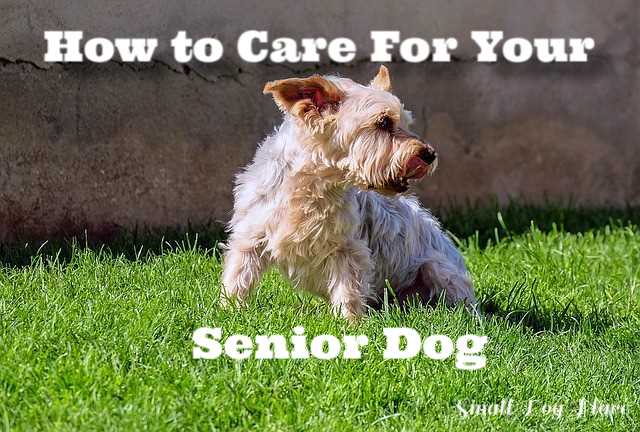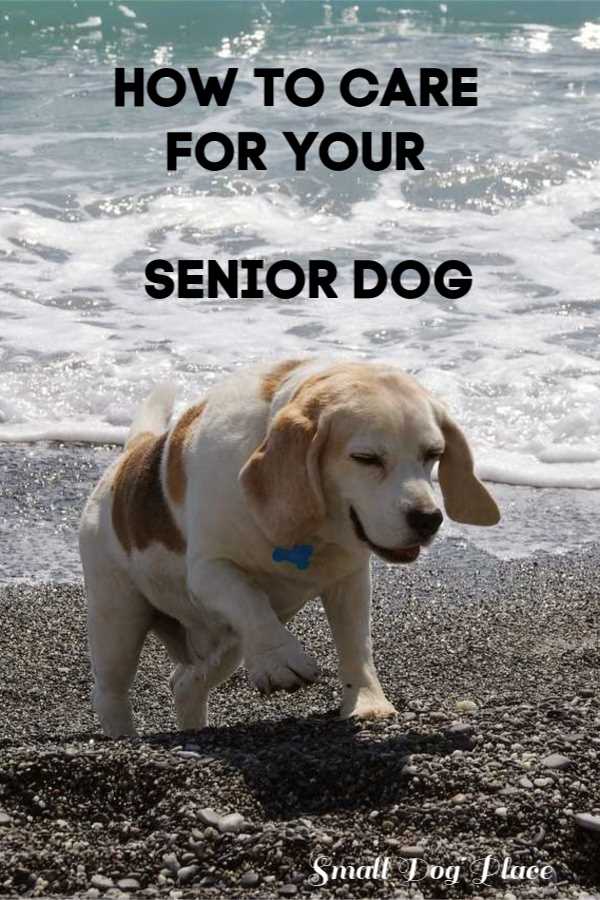- Small Dog Place Home
- Health
- Caring for Your Senior Dog
How to Care for Your Senior Dog: 12 Ways to Show Your Love
Care for Your Senior Dog
When your faithful friend begins to get older, it can be hard to know how to help them navigate the aches and pains of old age. It can be easy to deny noticing the signs that they’re no longer the youthful puppy we remember them as.
It’s essential to take action early on though so you can slow down the progression of symptoms that come with aging.
 Care for Your Senior Dog: Ten Top Tips
Care for Your Senior Dog: Ten Top TipsHow to Care for Your Senior Dog: 13 Tips
These ten tips are a great place to start when you’re dealing with an aging dog and can make both your lives easier:
1. Don't Neglect Exercise
Every dog needs daily activity, but keeping your dog active as they age is extremely important. Unfortunately, sore joints and muscles can make it difficult to get moving, so patience and moderation are crucial.
If you overdo exercise, it can exacerbate issues rather than alleviate them. The importance of getting them outside at least once a day is vital for keeping your dog at a healthy weight, agile, and happy.
Getting to the dog park regularly or attending a doggy daycare can also be good ways to promote socialization, which is equally important for dogs as they age.
2. Veterinary Care
It is essential to keep up with yearly health visits with your veterinarian, but it's imperative when your aging dog receives good care.
Vaccinations, testing, medications, and advice are essential for any age, especially older dogs. When addressed early, health problems can become less of a concern.
Be sure to keep up with all vaccinations recommended in your area. Heartworm testing and fecal exams is also something that should be a yearly lab test. Talk to your vet if you've noticed any concerns that might lead to problems later on.
3. Upgrade Their Dog Bed
When they’re younger, dogs will sleep just about anywhere, whether it be the grass outside or the backseat of the car. But as they age though, your dog will thank you for providing them with a comfortable bed they can lounge in throughout the day and night.
They’re sure to have sweeter dreams if they’re sleeping soundly and regularly with a soft bed providing support for aging bones. You will find a variety of dog beds out there to meet any number of your dog’s needs, from memory foam to temperature-controlled.
And if you have a large house, you can place a bed in a few different rooms, so their special spot is always available.
4. Consider Alternative Therapies
When you consider how to care for your senior dog, don't rule out alternative therapies. Alternative therapies have been quickly gaining popularity among people and, not surprisingly, they’re also gaining traction in the dog world.
These alternative therapies can give your aging dog the relief they need without any harsh side effects:
5. Hydrotherapy
This therapy involves light exercise in a pool, using the natural resistance of the water to help gently exercise arthritic joints and tight muscles.
6. Acupuncture
Especially useful for improving chronic conditions, animal acupuncturists use tiny needles to pinpoint various points and is believed to help align the body’s energy. Read more about Acupuncture, here.
7. Physical Therapy
Physical therapy can involve several different techniques, including massage therapy, but it does require some dedication from the owner to practice exercises between sessions.
Of course, as with anything regarding your dog’s health, make sure to consult your veterinarian before beginning a new health regimen.
8. Keep Up With Grooming
Every dog needs to be grooming regularly, but as a dog ages, it becomes especially important to practice regular care of things like their coat and nails. This suggestion is definitely for longer-haired dogs as their fur can become tangled and matted.
As a young and active pup, your dog’s nails stay trimmed naturally but, with reduced mobility, nails can get overgrown, so it’s essential to keep them trimmed or ground down with a dremel. The longer your dog’s nails are, the more likely they are to be in pain, causing a downward, negative spiral.
9. Adjust Their Diet
Older dogs often have more sensitive stomachs, so things like table scraps and low-quality dog food can cause digestion issues. Weight gain also becomes a problem for some geriatric pets, made worse by the fact that they’re much less active than they once were.
If you’ve been feeding your dog dry kibble, it may be time to make the switch to wet food as it’s much easier to eat and prevents constipation – alternatively, you might consider soaking their food or making a home-made version with rice, vegetables, and some protein.
10. Consider Adding Supplements
Since there’s a chance that your dog may be eating less these days as their appetite can decline with age, you should consider incorporating vitamins or supplements to your dog’s meals. By starting early enough, it’s possible to prevent problems down the road or at least stave them off for a few years.
Some common supplements recommended for older animals are fish oil, glucosamine, and hyaluronic acid. As previously stated, make sure to check with your veterinarian first as they can give you a better idea of what your dog might benefit from and can also help figure out which dosage is right for them.
Small Dog Place Recommends NuJoint Plus® and DS®
For healthy hips and joints, we recommend NuJoint Plus®, an all natural product that contains Glucosamine, Chondroitin, MSM, and Vitamin C. Not only does it promote healthy joints, but also rebuilds cartilage, keeps joints lubricated and improves mobility. Learn more about the NuJoint Plus Line. If you decide to order, please use order coe 24352.
11. Maintain Comfort Year Round
As your pet gets older, they can become more sensitive to extreme weather conditions, and it’s important to take steps to make them more comfortable.
In cold weather, it’s good to make sure they have a cozy, blanket-lined bed where they can keep insulated and warm at night.
In hotter climates, you can help keep older dogs with a kiddie pool, sprinklers, or hose they can play in.
It’s always good to always have plenty of water on hand, so they stay hydrated after a long day in the sun.
A sign your dog may be overheating is if they’re excessively panting, so it’s always important to pay attention to their physical symptoms.
12. Minimize Travel
Many dogs dislike travel no matter their age is though, the older they get, the more likely their anxiety will increase, especially on long trips. Getting in and out of cars can be difficult, and confined spaces can be upsetting, especially when combined with loud noises and visual stimuli.
If you are planning a vacation, consider hiring a pet sitter that will come to your home. Your senior dog can still have the comforts of home and the added benefits of having a trained person care for him.
If you will be traveling with your dog, use a crate or carrier. Car seats are also helpful if your dog likes to look out the window. Air travel is a whole other ordeal and, unless unavoidable, is probably not the best idea for older dogs, especially brachycephalic dog breeds.
About Janice (author and voice behind this site)
Having lived with dogs and cats most of her life, Janice served as a veterinary technician for ten years in Maryland and twelve years as a Shih Tzu dog breeder in Ohio.
Her education includes undergraduate degrees in Psychology with a minor in biology, Early Childhood Education, and Nursing, and a master's in Mental Health Counseling.
She is a lifelong learner, a dog lover, and passionate about the welfare of animals. Her favorite breed for over 50 years has been the Shih Tzu, but she has also lived with Poodles, Maltese, Yorkshire Terriers, Beagles, English Bulldogs, Carin Terriers, and a Cocker Spaniel.
When not writing, reading, and researching dog-related topics, she likes to spend time with her eight Shih Tzu dogs, husband, and family, as well as knitting and crocheting. She is also the voice behind Miracle Shih Tzu and Smart-Knit-Crocheting
Does This Article Deserve Your Thumbs Up?
We always appreciate your support and encouragement. Your thumbs up means so much to us. Please like this article.
If you find this page or any page on Small Dog Place Helpful, or useful in anyway, I'd love it if you would click the small heart found on the bottom right of each page.
You can also share or bookmark this page -- just click on the:

Free Monthly Newsletter
Sign Up for Our Free Newsletter and get our Free Gift to You.
my E-book, The Top 10 Mistakes People Make When Choosing a Dog (and how to avoid them)


